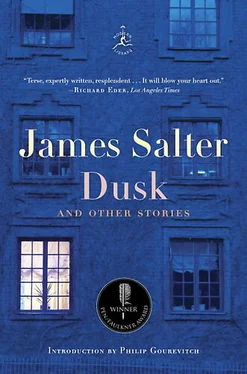“They are children here,” Inge says. “In Germany, now, you have a little respect. A man doesn’t treat you like that, he knows what to do.”
“Nico,” he calls.
She comes in brushing her hair.
“I am frightening him,” Inge explains. “Do you know what I finally did? I called at five in the morning. I said, why didn’t you call? I don’t know, he said—I could tell he was asleep—what time is it? Five o’clock, I said. Are you angry with me? A little, he said. Good, because I am angry with you. Bang, I hung up.”
Nico is closing the doors to the terrace and bringing the cage inside.
“It’s warm,” Malcolm says, “leave him there. He needs the sunlight.”
She looks in at the bird.
“I don’t think he’s well,” she says.
“He’s all right.”
“The other one died last week,” she explains to Inge. “Suddenly. He wasn’t even sick.”
She closes one door and leaves the other open. The bird sits in the now brilliant sunshine, feathered, serene.
“I don’t think they can live alone,” she says.
“He’s fine,” Malcolm assures her. “Look at him.”
The sun makes his colors very bright. He sits on the uppermost perch. His eyes have perfect, round lids. He blinks.
The elevator is still at their floor. Inge enters first. Malcolm pulls the narrow doors to. It’s like shutting a small cabinet. Faces close together they start down. Malcolm is looking at Inge. She has her own thoughts.
They stop for another coffee at the little bar downstairs. He holds the door open for them to go in. No one is there—a single man reading the newspaper.
“I think I’m going to call him again,” Inge says.
“Ask him why he woke you up at five in the morning,” Malcolm says.
She laughs.
“Yes,” she says. “That’s marvelous. That’s what I’m going to do.”
The telephone is at the far end of the marble counter, but Nico is talking to him and he cannot hear.
“Aren’t you interested?” he asks.
“No,” she says.
Inge’s car is a blue Volkswagen, the blue of certain airmail envelopes. One fender is dented in.
“You haven’t seen my car,” she says. “What do you think? Did I get a good bargain? I don’t know anything about cars. This is my first. I bought it from someone I know, a painter, but it was in an accident. The motor is scorched.
“I know how to drive,” she says. “It’s better if someone sits next to me, though. Can you drive?”
“Of course,” he says.
He gets behind the wheel and starts the engine. Nico is sitting in the back.
“How does it feel to you?” Inge says.
“I’ll tell you in a minute.”
Although it’s only a year old, the car has a certain shabbiness. The material on the ceiling is faded. Even the steering wheel seems abused. After they have driven a few blocks, Malcolm says, “It seems all right.”
“Yes?”
“The brakes are a little weak.”
“They are?”
“I think they need new linings.”
“I just had it greased,” she says.
Malcolm looks at her. She is quite serious.
“Turn left here,” she says.
She directs him through the city. There is a little traffic now but he seldom stops. Many intersections in Barcelona are widened out in the shape of an octagon. There are only a few red lights. They drive through vast neighborhoods of old apartments, past factories, the first vacant fields at the edge of town. Inge turns in her seat to look back to Nico.
“I’m sick of this place,” she says. “I want to go to Rome.”
They are passing the airport. The road to the sea is crowded. All the scattered traffic of the city has funneled onto it, buses, trucks, innumerable small cars.
“They don’t even know how to drive,” Inge says. “What are they doing? Can’t you pass?
“Oh, come on,” she says. She reaches across him to blow the horn.
“No use doing that,” Malcolm says.
Inge blows it again.
“They can’t move.”
“Oh, they make me furious,” she cries.
Two children in the car ahead have turned around. Their faces are pale and reflective in the small rear window.
“Have you been to Sitges?” Inge says.
“Cadaques.”
“Ah,” she says. “Yes. Beautiful. There you have to know someone with a villa.”
The sun is white. The land lies beneath it the color of straw. The road runs parallel to the coast past cheap bathing beaches, campgrounds, houses, hotels. Between the road and the sea is the railroad with small tunnels built beneath it for bathers to reach the water. After a while this begins to disappear. They drive along almost deserted stretches.
“In Sitges,” Inge says, “are all the blond girls of Europe. Sweden, Germany, Holland. You’ll see.”
Malcolm watches the road.
“The brown eyes of the Spaniards are irresistible to them,” she says.
She reaches across him to blow the horn.
“Look at them! Look at them crawling along!
“They come here full of hopes,” Inge says. “They save their money, they buy little bathing suits you could put in a spoon, and what happens? They get loved for one night, perhaps, that’s all. The Spanish don’t know how to treat women.”
Nico is silent in the back. On her face is the calm expression which means she is bored.
“They know nothing,” Inge says.
Sitges is a little town with damp hotels, the green shutters, the dying grass of a beach resort. There are cars parked everywhere. The streets are lined with them. Finally they find a place two blocks from the sea.
“Be sure it’s locked,” Inge says.
“Nobody’s going to steal it,” Malcolm tells her.
“Now you don’t think it’s so nice,” she says.
They walk along the pavement, the surface of which seems to have buckled in the heat. All around are the flat, undecorated facades of houses built too close together. Despite the cars, the town is strangely vacant. It’s two o’clock. Everyone is at lunch.
Malcolm has a pair of shorts made from rough cotton, the blue glazed cotton of the Tauregs. They have a little belt, slim as a finger, which goes only halfway around. He feels powerful as he puts them on. He has a runner’s body, a body without flaws, the body of a martyr in a Flemish painting. One can see vessels laid like cord beneath the surface of his limbs. The cabins have a concrete back wall and hemp underfoot. His clothes hang shapeless from a peg. He steps into the corridor. The women are still undressing, he does not know behind which door. There is a small mirror hung from a nail. He smooths his hair and waits. Outside is the sun.
The sea begins with a sloping course of pebbles sharp as nails. Malcolm goes in first. Nico follows without a word. The water is cool. He feels it climb his legs, touch the edge of his suit and then with a swell—he tries to leap high enough—embrace him. He dives. He comes up smiling. The taste of salt is on his lips. Nico has dived, too. She emerges close by, softly, and draws her wetted hair behind her with one hand. She stands with her eyes half-closed, not knowing exactly where she is. He slips an arm around her waist. She smiles. She possesses a certain, sure instinct of when she is most beautiful. For a moment they are in serene dependence. He lifts her in his arms and carries her, helped by the sea, toward the deep. Her head rests on his shoulder. Inge lies on the beach in her bikini reading Stern .
“What’s wrong with Inge?” he says.
“Everything.”
“No, doesn’t she want to come in?”
“She’s having her period,” Nico says.
They lie down beside her on separate towels. She is, Malcolm notices, very brown. Nico can never get that way no matter how long she stays outside. It is almost a kind of stubbornness as if he, himself, were offering her the sun and she would not accept.
Читать дальше












